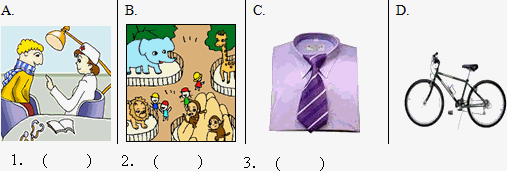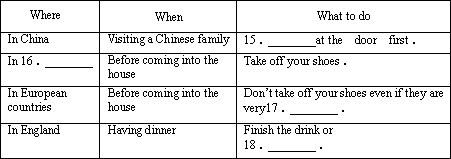| 答案:1.C 2.A 3.B 4.C 5.B 6.D 7.C 8.A 9.A 10.C 11.C 12.B 13.C 14.A 15.Knock 16.Japan 17.dirty 18.the food 听力材料 一、听对话,选择与对话内容相符的图片,将代表图片的字母填写在相应序号后的括号内。每段对话读两遍。请看第一组的四幅图片,听三段对话,回答第1~3小题。 Conversation 1 W:How nice!Is it your new shirt David? M:Yes I bought it six days ago. Conversation 2 W:What’s the matter young man? M:Er…I’ve got a toothache. Conversation 3 W:Do you have a school trip? M:Yes we do.We want to go to the zoo. 请看第二组的四幅图片,听三段对话,回答第4 ~ 6小题。 Conversation 4 W:Peter what would you like to drink? M:Coffee please. Conversation 5 W:Do you love dancing? M:Yes.I often go dancing at weekends. Conversation 6 W:Will people have robots in their homes in the future? M:I think so. 二、听对话或独白,根据对话或独白内容,从下列各题所给的选项中,选择正确答案。对话和独白朗读两遍。听第一段对话,回答第7 ~ 8小题。 M:Morning madam.What can I do for you? W:I am very sorry.I’d like to change this sweater. M:What seems to be the problem? W:Well you see.I got this sweater as a birthday present for a friend of mine but it’s the wrong size. M:Oh you can have a bigger one.But I’m afraid they are not the same price.The difference is $20. W:All right.Here you are. M:Thank you very much. W:Thank you for your help. 听第二段对话,回答第9 ~ 11小题。 W:Seat 14A is right here sir.You may take your seat.I will put your bag above. M:Thank you Miss.You’ll offer supper on the plane won’t you? W:Yes sir.I’ll bring you a menu shortly after we take off. M:That would be nice.By the way how long will this flight last? W:It will last three hours.Now it is six o’clock.We’ll arrive in Chicago at nine o’clock. M:Great!I’ll arrive in Chicago in three hours and in one more hour I’ll be at home. 听一段独白,回答第12 ~ 14小题。 Now it’s time for news. Chinese Premier Wen Jiabao has visited the“left-behind”children whose parents are working in cities before Children’s Day. During the visit to northwest China’s Shanxi Province Wen visited the home of Yang Saike a primary school boy in a village of Xingping City. Yang whose parents were working in Fujian thousands of kilometers away was cared for by his grandparents.His parents failed to go home even once a year. The premier held Yang in his arms and looked through his exercise book and praised him for his hard work. Wen talked with many children and asked them many questions about their schooling and life. “You are so pretty ”Wen said to Liu Mengqi a seven-year-old girl living with her grandmother Liu’s parents were also working in the city. “Have you been to school yet?”Wen asked two other girls. “We are going to the pre–school class ”said one. “Mom and dad at home?”Wen asked.The children shook their heads. “Children cannot see their parents very often which is a new problem in the countryside.We should give them more care and love ”said the premier. With fast economic development more people in the country chose to work in cities and left their children with grandparents back home said Wen. The premier asked local governments to do something to protect and care for such children at home and freeing their parents in cities from worries about their children. 三、听下面的一段独白,根据题目要求在相应题号后的横线上记录关键信息。独白读三遍。 Different countries and people have different manners.Here are some examples.If you visit a Chinese family you should knock at the door first.When the door opens you should not move before the host says “Come in please.”Before coming into the house in Japan it is good manners to take off your shoes.In European countries even if your shoes are very dirty this is not done.In England a guest always finishes the drink or the food to show that he enjoys it.This will make the host very pleased. | 

